情态动词和一般现在时习题
- 格式:doc
- 大小:34.00 KB
- 文档页数:13
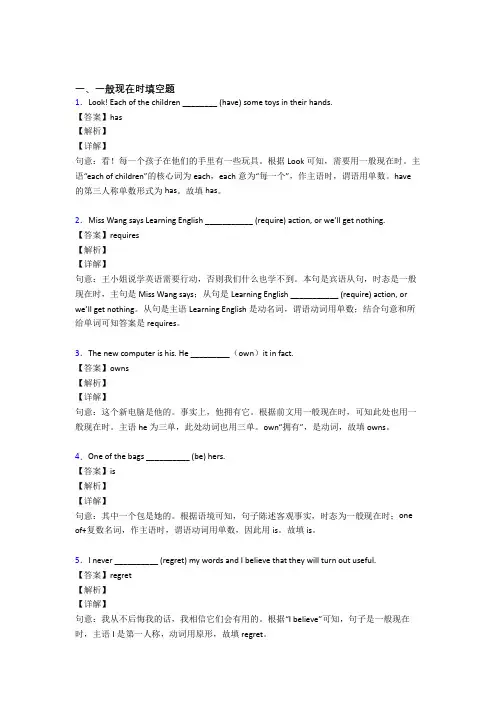
一、一般现在时填空题1.Look! Each of the children ________ (have) some toys in their hands.【答案】has【解析】【详解】句意:看!每一个孩子在他们的手里有一些玩具。
根据Look可知,需要用一般现在时。
主语“each of children”的核心词为each,each意为“每一个”,作主语时,谓语用单数。
have 的第三人称单数形式为has。
故填has。
2.Miss Wang says Learning English ___________ (require) action, or we’ll get nothing.【答案】requires【解析】【详解】句意:王小姐说学英语需要行动,否则我们什么也学不到。
本句是宾语从句,时态是一般现在时,主句是Miss Wang says;从句是Learning English ___________ (require) action, or we’ll get nothing。
从句是主语Learning English是动名词,谓语动词用单数;结合句意和所给单词可知答案是requires。
3.The new computer is his. He _________(own)it in fact.【答案】owns【解析】【详解】句意:这个新电脑是他的。
事实上,他拥有它。
根据前文用一般现在时,可知此处也用一般现在时。
主语he为三单,此处动词也用三单。
own“拥有”,是动词,故填owns。
4.One of the bags __________ (be) hers.【答案】is【解析】【详解】句意:其中一个包是她的。
根据语境可知,句子陈述客观事实,时态为一般现在时;one of+复数名词,作主语时,谓语动词用单数,因此用is。
故填is。
5.I never __________ (regret) my words and I believe that they will turn out useful.【答案】regret【解析】【详解】句意:我从不后悔我的话,我相信它们会有用的。
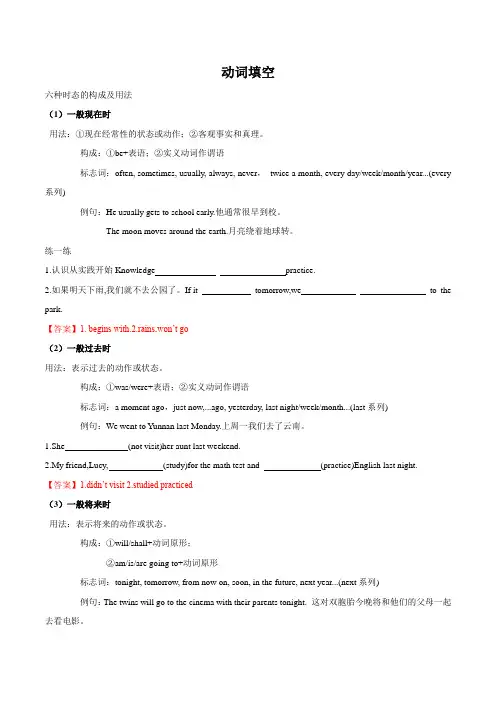
动词填空六种时态的构成及用法(1)一般现在时用法:①现在经常性的状态或动作;②客观事实和真理。
构成:①be+表语;②实义动词作谓语标志词:often, sometimes, usually, always, never,twice a month, every day/week/month/year...(every 系列)例句:He usually gets to school early.他通常很早到校。
The moon moves around the earth.月亮绕着地球转。
练一练1.认识从实践开始Knowledge practice.2.如果明天下雨,我们就不去公园了。
If it tomorrow,we to the park.【答案】1. begins with.2.rains,won’t go(2)一般过去时用法:表示过去的动作或状态。
构成:①was/were+表语;②实义动词作谓语标志词:a moment ago,just now,...ago, yesterday, last night/week/month...(last系列)例句:We went to Yunnan last Monday.上周一我们去了云南。
1.She (not visit)her aunt last weekend.2.My friend,Lucy, (study)for the math test and (practice)English last night.【答案】1.didn’t visit 2.studied practiced(3)一般将来时用法:表示将来的动作或状态。
构成:①will/shall+动词原形;②am/is/are going to+动词原形标志词:tonight, tomorrow, from now on, soon, in the future, next year...(next系列)例句:The twins will go to the cinema with their parents tonight. 这对双胞胎今晚将和他们的父母一起去看电影。
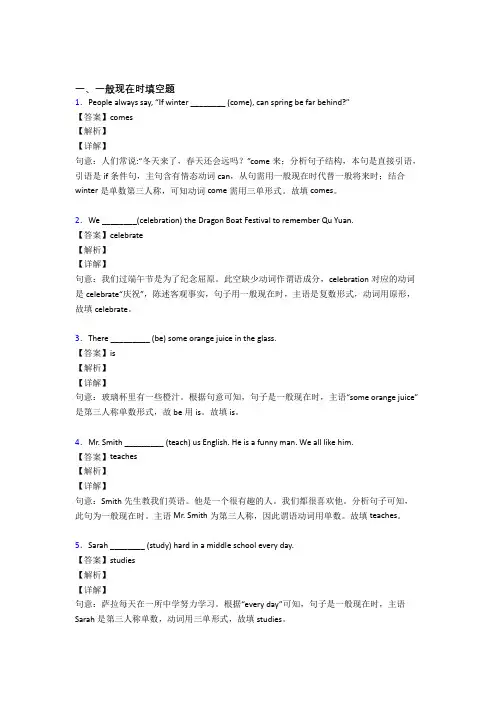
一、一般现在时填空题1.People always say, “If winter ________ (come), can spring be far behind?”【答案】comes【解析】【详解】句意:人们常说:“冬天来了,春天还会远吗?”come来;分析句子结构,本句是直接引语,引语是if条件句,主句含有情态动词can,从句需用一般现在时代替一般将来时;结合winter是单数第三人称,可知动词come需用三单形式。
故填comes。
2.We ________(celebration) the Dragon Boat Festival to remember Qu Yuan.【答案】celebrate【解析】【详解】句意:我们过端午节是为了纪念屈原。
此空缺少动词作谓语成分,celebration对应的动词是celebrate“庆祝”,陈述客观事实,句子用一般现在时,主语是复数形式,动词用原形,故填celebrate。
3.There _________ (be) some orange juice in the glass.【答案】is【解析】【详解】句意:玻璃杯里有一些橙汁。
根据句意可知,句子是一般现在时,主语“some orange juice”是第三人称单数形式,故be用is。
故填is。
4.Mr. Smith _________ (teach) us English. He is a funny man. We all like him.【答案】teaches【解析】【详解】句意:Smith先生教我们英语。
他是一个很有趣的人。
我们都很喜欢他。
分析句子可知,此句为一般现在时。
主语Mr. Smith为第三人称,因此谓语动词用单数。
故填teaches。
5.Sarah ________ (study) hard in a middle school every day.【答案】studies【解析】【详解】句意:萨拉每天在一所中学努力学习。
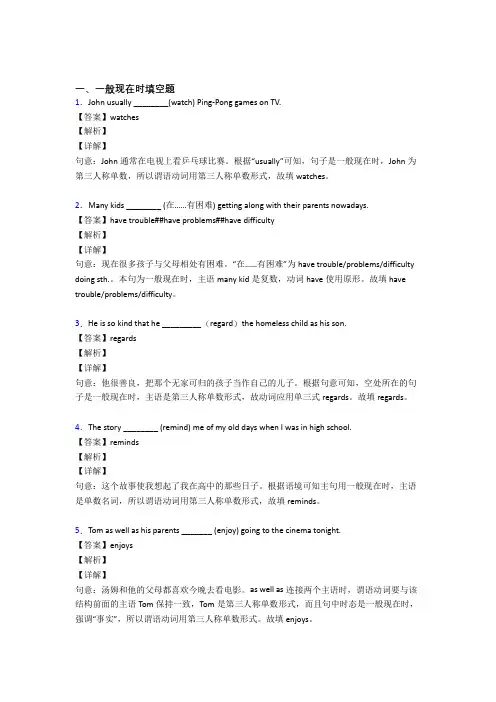
一、一般现在时填空题1.John usually ________(watch) Ping-Pong games on TV.【答案】watches【解析】【详解】句意:John通常在电视上看乒乓球比赛。
根据“usually”可知,句子是一般现在时,John为第三人称单数,所以谓语动词用第三人称单数形式,故填watches。
2.Many kids ________ (在……有困难) getting along with their parents nowadays.【答案】have trouble##have problems##have difficulty【解析】【详解】句意:现在很多孩子与父母相处有困难。
“在……有困难”为have trouble/problems/difficulty doing sth.。
本句为一般现在时,主语many kid是复数,动词have使用原形。
故填have trouble/problems/difficulty。
3.He is so kind that he _________(regard)the homeless child as his son.【答案】regards【解析】【详解】句意:他很善良,把那个无家可归的孩子当作自己的儿子。
根据句意可知,空处所在的句子是一般现在时,主语是第三人称单数形式,故动词应用单三式regards。
故填regards。
4.The story ________ (remind) me of my old days when I was in high school.【答案】reminds【解析】【详解】句意:这个故事使我想起了我在高中的那些日子。
根据语境可知主句用一般现在时,主语是单数名词,所以谓语动词用第三人称单数形式,故填reminds。
5.Tom as well as his parents _______ (enjoy) going to the cinema tonight.【答案】enjoys【解析】【详解】句意:汤姆和他的父母都喜欢今晚去看电影。
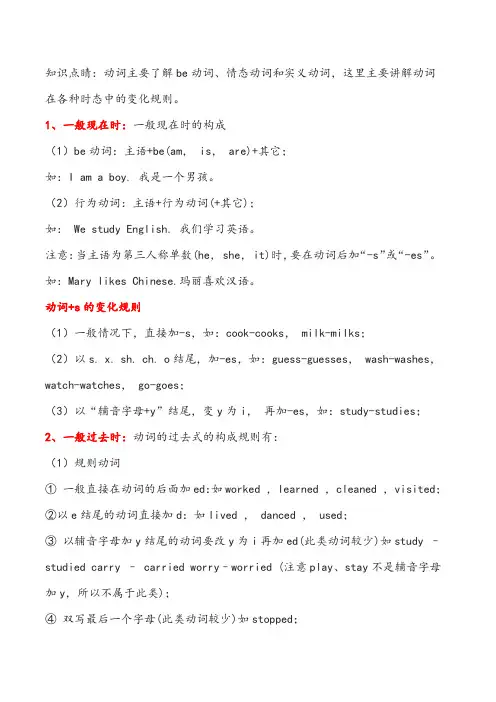
知识点睛:动词主要了解be动词、情态动词和实义动词,这里主要讲解动词在各种时态中的变化规则。
1、一般现在时:一般现在时的构成(1)be动词:主语+be(am, is, are)+其它;如:I am a boy. 我是一个男孩。
(2)行为动词:主语+行为动词(+其它);如: We study English. 我们学习英语。
注意:当主语为第三人称单数(he, she, it)时,要在动词后加“-s”或“-es”。
如:Mary likes Chinese.玛丽喜欢汉语。
动词+s的变化规则(1)一般情况下,直接加-s,如:cook-cooks, milk-milks;(2)以s. x. sh. ch. o结尾,加-es,如:guess-guesses, wash-washes,watch-watches, go-goes;(3)以“辅音字母+y”结尾,变y为i,再加-es,如:study-studies;2、一般过去时:动词的过去式的构成规则有:(1)规则动词①一般直接在动词的后面加ed:如worked , learned , cleaned , visited;②以e结尾的动词直接加d:如lived , danced , used;③以辅音字母加y结尾的动词要改y为i再加ed(此类动词较少)如study –studied carry – carried worry–worried (注意play、stay不是辅音字母加y,所以不属于此类);④双写最后一个字母(此类动词较少)如stopped;(2)不规则动词(此类词并无规则,须熟记)小学阶段要记住以下动词的原形和过去式:sing – sang , eat– ate ,see – saw , have – had , do – did , go – went , take – took , buy – bought , get –got ,read – read,fly – flew , am/is – was ,are – were , say – said ,leave – left , swim – swam , tell – told , draw – drew ,come – came , lose– lost , find – found , drink – drank , hurt –hurt , feel – felt;3、一般将来时:基本结构:(1)be going to + do;(2)will+ do. be going to = willI am going to go swimming tomorrow(明天). = I will go swimming tomorrow.4、现在进行时: am,is,are+动词现在分词;动词的ing形式的构成规则:(1)一般的直接在后面加上ing ,如doing , going , working , singing ,eating;(2)以e 结尾的动词,要先去e再加ing,如having , writing;(3)双写最后一个字母的(此类动词极少)有:running , swimming ,sitting , getting;知识点冲刺训练一、单项选择1.( )She ____ curly black hair and ____ glasses.A.wear; hasB.has; wearC.has; wears2.( )We're going to ____ the Eiffel Tower.A.lookB.watchC.see3.( )My mother ____ me ____ my school by car every day.A.took; toB.takes; toC.takes; for4.( )He ____ English because he was ill.A.didn't go to studyB.doesn't go to studyC.went to study5.( )—____ your father ____ at home?—No, he ____ in a factory.A.Is; work; workB.Does; work; worksC.Is; works; works6.( )—I ____ a present for you.—Thanks a lot.A.gaveB.sentC.bought7.( )—What ____ he look like?—He is tall.A.isB.doesC.are8.( )—Where are the students?—____ in the playground.A.She'sB.There areC.They're9.( )____, everyone. The floor is very wet.A.Watch outB.Look oute outD.Make out 10.( )There ____ any people on the farm yesterday afternoon.A.isn'tB.wereC.weren't二、句型转换11.按要求完成句子(每空一词)。
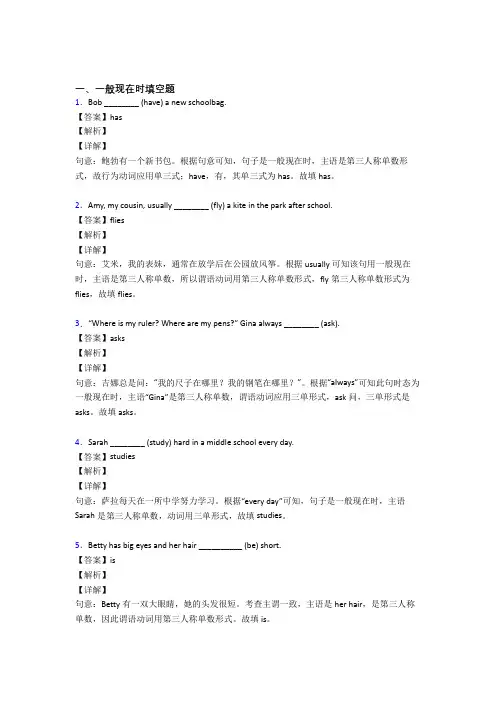
一、一般现在时填空题1.Bob ________ (have) a new schoolbag.【答案】has【解析】【详解】句意:鲍勃有一个新书包。
根据句意可知,句子是一般现在时,主语是第三人称单数形式,故行为动词应用单三式;have,有,其单三式为has。
故填has。
2.Amy, my cousin, usually ________ (fly) a kite in the park after school.【答案】flies【解析】【详解】句意:艾米,我的表妹,通常在放学后在公园放风筝。
根据usually可知该句用一般现在时,主语是第三人称单数,所以谓语动词用第三人称单数形式,fly第三人称单数形式为flies,故填flies。
3.“Where is my ruler? Where are my pens?” Gina always ________ (ask).【答案】asks【解析】【详解】句意:吉娜总是问:“我的尺子在哪里?我的钢笔在哪里?”。
根据“always”可知此句时态为一般现在时,主语“Gina”是第三人称单数,谓语动词应用三单形式,ask问,三单形式是asks。
故填asks。
4.Sarah ________ (study) hard in a middle school every day.【答案】studies【解析】【详解】句意:萨拉每天在一所中学努力学习。
根据“every day”可知,句子是一般现在时,主语Sarah是第三人称单数,动词用三单形式,故填studies。
5.Betty has big eyes and her hair __________ (be) short.【答案】is【解析】【详解】句意:Betty有一双大眼睛,她的头发很短。
考查主谓一致,主语是her hair,是第三人称单数,因此谓语动词用第三人称单数形式。
故填is。
6.The little girl ________ (dress) herself every morning.【答案】dresses【解析】【详解】句意:那个小女孩每天给自己穿衣服。

英语语法一般现在时,结构、用法全打尽!(附习题)一般现在时(The Simple Present Tense)是我们英语学习中接触到的第一个时态,也是初一英语最重要的语法内容之一。
和老师全方位学习一下吧!一. 一般现在时有三种形式1. 谓语是be(am/is/are)的一般现在时。
①肯定形式:主语+be+表语(形容词、名词充当表语)。
I am hungry.You are beautiful.He is a doctor.②否定形式:主语+be+not+表语(形容词、名词充当表语)。
I am not hungry.You aren't beautiful.He isn't a doctor.③一般疑问句形式:Be+主语+表语(形容词、名词充当表语)?肯定回答:Yes,主语+be. 否定回答:No, 主语+ be+not.—Are you hungry?—Yes,I am./No,I'm not.—Is he a doctor?—Yes, he is./No, he isn,t.④特殊疑问句形式:特殊疑问词+Be开头的一般疑问句?—What is he?—He is a doctor.注意:be要随着主语变。
2. 谓语动词是实义动词(及物动词或不及物动词)的一般现在时。
①肯定形式:“主语+及物动词+宾语”或“主语+不及物动词”。
She has a little brother.她有一个弟弟。
The sun rises in the east.太阳从东方升起。
②否定形式:“主语+don't/doesn't+及物动词+宾语”或“主语+don't/doesn't+不及物动词”。
She doesn't have a little brother.她没有弟弟。
I don't eat every morning.我每天早晨都不吃饭。
③一般疑问句形式:“Do/Does+主语+及物动词原形+宾语”或“Do/Does+主语+不及物动词原形”。
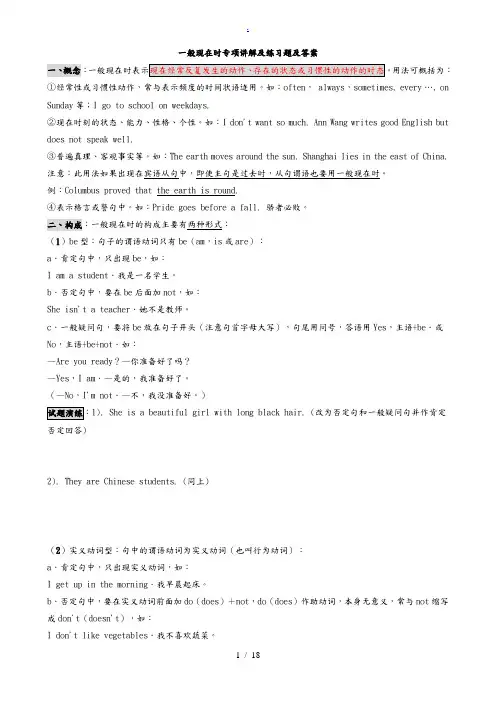
一般现在时专项讲解及练习题及答案一、概念:用法可概括为:①经常性或习惯性动作,常与表示频度的时间状语连用。
如:often, always,sometimes, every …, on Sunday等;I go to school on weekdays.②现在时刻的状态、能力、性格、个性。
如:I don't want so much. Ann Wang writes good English but does not speak well.③普遍真理、客观事实等。
如:The earth moves around the sun. Shanghai lies in the east of China. 注意:此用法如果出现在宾语从句中,即使主句是过去时,从句谓语也要用一般现在时。
例:Columbus proved that the earth is round.④表示格言或警句中。
如:Pride goes before a fall. 骄者必败。
二、构成:一般现在时的构成主要有两种形式:(1)be型:句子的谓语动词只有be(am,is或are):a.肯定句中,只出现be,如:I am a student.我是一名学生。
b.否定句中,要在be后面加not,如:She isn't a teacher.她不是教师。
c.一般疑问句,要将be放在句子开头(注意句首字母大写),句尾用问号,答语用Yes,主语+be.或No,主语+be+not.如:—Are you ready?—你准备好了吗?—Yes,I am.—是的,我准备好了。
(—No,I'm not.—不,我没准备好。
)1). She is a beautiful girl with long black hair. (改为否定句和一般疑问句并作肯定否定回答)2). They are Chinese students. (同上)(2)实义动词型:句中的谓语动词为实义动词(也叫行为动词):a.肯定句中,只出现实义动词,如:I get up in the morning.我早晨起床。
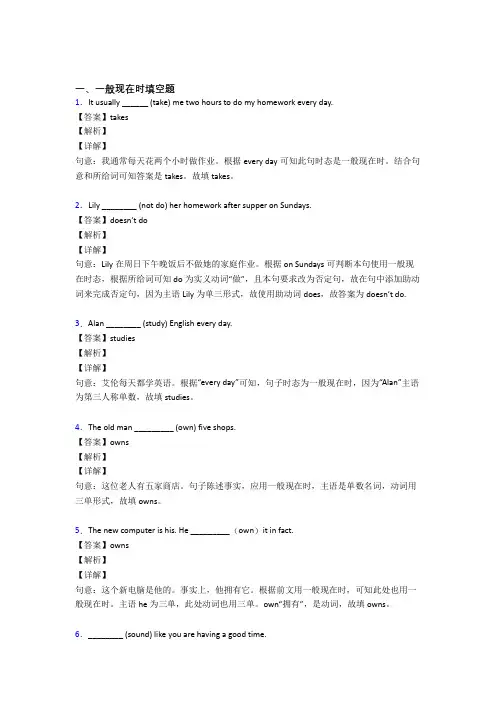
一、一般现在时填空题1.It usually ______ (take) me two hours to do my homework every day.【答案】takes【解析】【详解】句意:我通常每天花两个小时做作业。
根据every day可知此句时态是一般现在时。
结合句意和所给词可知答案是takes。
故填takes。
2.Lily ________ (not do) her homework after supper on Sundays.【答案】doesn’t do【解析】【详解】句意:Lily在周日下午晚饭后不做她的家庭作业。
根据on Sundays可判断本句使用一般现在时态,根据所给词可知do为实义动词“做”,且本句要求改为否定句,故在句中添加助动词来完成否定句,因为主语Lily为单三形式,故使用助动词does,故答案为doesn’t do.3.Alan ________ (study) English every day.【答案】studies【解析】【详解】句意:艾伦每天都学英语。
根据“every day”可知,句子时态为一般现在时,因为“Alan”主语为第三人称单数,故填studies。
4.The old man _________ (own) five shops.【答案】owns【解析】【详解】句意:这位老人有五家商店。
句子陈述事实,应用一般现在时,主语是单数名词,动词用三单形式,故填owns。
5.The new computer is his. He _________(own)it in fact.【答案】owns【解析】【详解】句意:这个新电脑是他的。
事实上,他拥有它。
根据前文用一般现在时,可知此处也用一般现在时。
主语he为三单,此处动词也用三单。
own“拥有”,是动词,故填owns。
6.________ (sound) like you are having a good time.【答案】(S)ounds【解析】【详解】句意:听起来你玩得很开心。
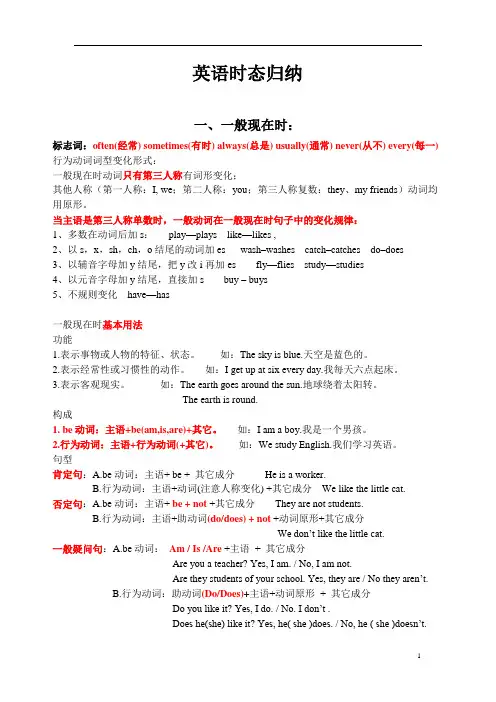
英语时态归纳一、一般现在时:标志词:often(经常) sometimes(有时) always(总是) usually(通常) never(从不) every(每一)行为动词词型变化形式:一般现在时动词只有第三人称有词形变化;其他人称(第一人称:I, we;第二人称:you;第三人称复数:they、my friends)动词均用原形。
当主语是第三人称单数时,一般动词在一般现在时句子中的变化规律:1、多数在动词后加s:play—plays like—likes ,2、以s,x,sh,ch,o结尾的动词加es wash–washes catch–catches do–does3、以辅音字母加y结尾,把y改i再加es fly—flies study—studies4、以元音字母加y结尾,直接加s buy – buys5、不规则变化have—has一般现在时基本用法功能1.表示事物或人物的特征、状态。
如:The sky is blue.天空是蓝色的。
2.表示经常性或习惯性的动作。
如:I get up at six every day.我每天六点起床。
3.表示客观现实。
如:The earth goes around the sun.地球绕着太阳转。
The earth is round.构成1. be动词:主语+be(am,is,are)+其它。
如:I am a boy.我是一个男孩。
2.行为动词:主语+行为动词(+其它)。
如:We study English.我们学习英语。
句型肯定句:A.be动词:主语+ be + 其它成分He is a worker.B.行为动词:主语+动词(注意人称变化) +其它成分We like the little cat.否定句:A.be动词:主语+ be + not+其它成分They are not students.B.行为动词:主语+助动词(do/does) + not+动词原形+其它成分We don’t like the little cat.一般疑问句:A.be动词:Am / Is /Are +主语+ 其它成分Are you a teacher? Yes, I am. / No, I am not.Are they students of your school. Yes, they are / No they aren’t.B.行为动词:助动词(Do/Does)+主语+动词原形+ 其它成分Do you like it? Yes, I do. / No. I don’t .Does he(she) like it? Yes, he( she )does. / No, he ( she )doesn’t.特殊疑问句:疑问词+ 一般疑问句A.be动词:How many students are there in your school?B.行为动词:What do you usually do on Sunday?一般现在时动词be和have的变化形式1.动词Be 叫连系动词, 用法:第一人称单数用am,第三人称单数用is,其它人称用are。
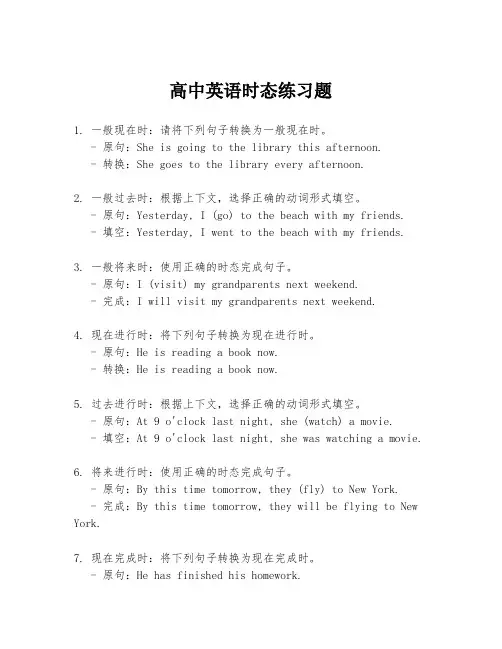
高中英语时态练习题1. 一般现在时:请将下列句子转换为一般现在时。
- 原句:She is going to the library this afternoon.- 转换:She goes to the library every afternoon.2. 一般过去时:根据上下文,选择正确的动词形式填空。
- 原句:Yesterday, I (go) to the beach with my friends.- 填空:Yesterday, I went to the beach with my friends.3. 一般将来时:使用正确的时态完成句子。
- 原句:I (visit) my grandparents next weekend.- 完成:I will visit my grandparents next weekend.4. 现在进行时:将下列句子转换为现在进行时。
- 原句:He is reading a book now.- 转换:He is reading a book now.5. 过去进行时:根据上下文,选择正确的动词形式填空。
- 原句:At 9 o'clock last night, she (watch) a movie.- 填空:At 9 o'clock last night, she was watching a movie.6. 将来进行时:使用正确的时态完成句子。
- 原句:By this time tomorrow, they (fly) to New York.- 完成:By this time tomorrow, they will be flying to New York.7. 现在完成时:将下列句子转换为现在完成时。
- 原句:He has finished his homework.- 转换:He has finished his homework.8. 过去完成时:根据上下文,选择正确的动词形式填空。
初中语法:情态动词知识点练习题一、情态动词单项选择题1.—Shall I tell him the change of the time right now?—I’m afraid you ________, otherwise he will be late for the meeting.A.can B.may C.must D.need【答案】C【解析】【详解】句意:——我现在就告诉他时间改变了,好吗?——恐怕你必须这么做,否则他开会就要迟到了。
考查情态动词辨析。
can能够,表能力或许可;may可以,表推测;must必须;need需要。
根据下文“otherwise he will be late for the meeting”,可知ABD三项不合语境,这里是说必须告诉他时间改了,故选C。
2.—I went to Mount Wudang last week. But there were too many people and it’s too hot.—It’s too bad. I think your trip ________ be unpleasant.A.c an’t B.should C.must D.need【答案】C【解析】【分析】【详解】句意:——我上周去了武当山。
但是人太多了,天气太热了。
——太糟糕了。
我想你的旅行一定很不愉快。
考查情态动词。
can’t不能;should应该;must一定;need需要。
根据“But there were too many people and it’s too hot.”判断,此次旅行一定是不愉快的,表示肯定的推测,用must be。
故选C。
3.________ you raise yo ur feet off the floor? I’d like to see if my pen is under the desk. A.Must B.Can C.Should D.May【答案】B【解析】【分析】【详解】句意:你可以把脚抬离地面吗?我想看看我的钢笔是否在课桌下面。
情态动词情态动词有can (could), may (might), must, have to, shall (should, will (would), dare (dared), need (needed), ought to等。
情态动词无人称和数的变化;不能单独使用,必须与其后的动词原形构成谓语。
一、can, could1) 表示能力(体力、知识、技能)。
如:Can you lift this heavy box? (体力)Mary can speak three languages.(知识)Can you skate?(技能)此时可用be able to代替。
Can只有一般现在式和一般过去式;而be able to则有更多的时态。
如:I’ll not be able to come this afternoon.当表示“经过努力才得以做成功某事”时应用be able to,不能用Can。
如:He was able to go to the party yesterday evening in spite of the heavy rain.2) 表示请求和允许。
-----Can I go now?----- Yes, you can. / No, you can’t.此时可与may互换。
在疑问句中还可用could, might代替,不是过去式,只是语气更委婉,不能用于肯定句和答语中。
---- Could I come to see you tomorrow?---- Yes, you can. ( No, I’m afraid not. )3) 表示客观可能性(客观原因形成的能力)。
They’ve changed the ti metable, so we can go by bus instead.This hall can hold 500 people at least.4) 表示推测(惊讶、怀疑、不相信的态度),用于疑问句、否定句和感叹句中。
一、一般现在时填空题1.Who can hold the meeting if Mr. White ________ ( not be) here this afternoon?【答案】isn’t【解析】【详解】句意:如果怀特先生今天下午不在,谁能主持会议?此处是if引导的条件状语从句,主句含有情态动词,从句用一般现在时态,主语是Mr. White,是单数,be动词用is,此处是否定句,is+not,缩写成isn’t,故填isn’t。
2.—Why do you hate working with Tom?—He is much selfish. He only ________ about himself. (care)【答案】cares【解析】【详解】句意:——你为什么讨厌和汤姆一起工作?——他很自私。
他只关心自己。
根据语境可知,该句为一般现在时,主语“He”是第三人称单数,谓语用动词的三单形式,“care”的三单形式是“cares”。
故填cares。
3.Liu Xiang _____________ (run) very fast and I want to be a man like him.【答案】runs【解析】【详解】句意:刘翔跑得非常快,我想成为像他一样的人。
根据空缺处所在的句子是客观事实,所以时态是一般现在时,主语“Liu Xiang”是第三人称单数,所以用动词run“跑”的第三人称单数runs,故填runs。
4.Sally ________ (walk) to school with her classmates every day.【答案】walks【解析】【详解】句意:Sally每天和她同学步行去上学。
根据“every day”可知,时态为一般现在时;主语“Sally”是第三人称单数,谓语动词要用单数形式。
故填walks。
5.Jack’s father is a ________ (飞行员).【答案】pilot【解析】【详解】句意:杰克的父亲是一名飞行员。
一、一般现在时填空题1.Who can hold the meeting if Mr. White ________ ( not be) here this afternoon?【答案】isn’t【解析】【详解】句意:如果怀特先生今天下午不在,谁能主持会议?此处是if引导的条件状语从句,主句含有情态动词,从句用一般现在时态,主语是Mr. White,是单数,be动词用is,此处是否定句,is+not,缩写成isn’t,故填isn’t。
2.There is a reading room in his school. He with his classmates always ________ (read) there in the afternoon.【答案】reads【解析】【详解】句意:在他的学校里有一个阅览室。
他和同学们总是下午在那里读书。
根据句子结构可知,本题考查就远一致原则。
当用作主语的成分后面跟有由with等引出的短语时,谓语动词习惯上要与这些结构前面的主语保持一致(即与比较远的那个主语保持一致)。
故句子的主语是(He),属于第三人称单数,空格处缺少谓语动词,应填第三人称单数,故填reads。
3.Little Tony ____________ (brush) his teeth every morning.【答案】brushes【解析】【详解】句意:小托尼每天早晨刷牙。
根据“ every morning”可知该句用一般现在时;根据主语是单数名词,所以谓语动词用第三人称单数形式;brush的第三人称单数形式是brushes,故填brushes。
4.The pair of shoes ________ (fit) you very well.【答案】fits【解析】【详解】句意:这双鞋很适合你。
fit“适合”,是动词。
the pair of作主语时,谓语动词用第三人称单数形式,故填fits。
(英语)英语一般现在时练习题20篇含解析一、初中英语一般现在时1.Xiao Ming never ________ home on foot. She often takes the subway.A. go toB. goes toC. walksD. goes【答案】 D【解析】【分析】句意:小明从不不行回家,他经常乘地铁。
词组:go home回家。
主语Xiao Ming 是第三人称单数,故用动词后加-s,因此选D。
【点评】考查一般现在时的第三人称单数形式。
2.Millions of people _________ the Great wall every year.A. visitedB. visitC. will visitD. are vesting 【答案】 B【解析】【分析】句意:成千万的人每年参观长城。
根据every year,可知句子时态为一般现在时,故答案是B。
【点评】考查一般现在时,注意根据时间状语确定句子的时态。
3.She _____ out alone at night.A. dare not to goB. dares not goC. doesn't dare to goD. doesn't dares go【答案】 C【解析】【分析】句意:晚上她不敢一个人出去。
dare可以作情态动词也可以作行为动词,作情态动词时,后面直接跟动词原形,没有人称与数的变化,构成否定时直接在dare 后加not,作行为动词时后跟动词不定式,构成否定需要助动词,故答案是C。
【点评】考查dare的用法,注意dare做情态动词和行为动词的用法上的区别。
4.If he _____ the money, he _____ a lot of clothes.A. has; will buyB. had; boughtC. had; would buyD. had; will buy 【答案】 A【解析】【分析】句意:如果他有钱,他会买许多衣服。
时态语态高中练习题及讲解### 时态语态高中练习题及讲解#### 练习题1. 一般现在时:请用一般现在时翻译下列句子。
- 他每天早晨跑步。
- 地球绕着太阳转。
2. 一般过去时:将下列句子转换为一般过去时。
- 我昨天去了图书馆。
- 他们去年在这个城市买了房子。
3. 一般将来时:使用一般将来时构造以下句子。
- 明天我会去看电影。
- 她下个月将会参加一个会议。
4. 现在进行时:根据给定的动词,构造现在进行时的句子。
- 她正在学习。
- 他们正在讨论。
5. 过去进行时:将下列句子转换为过去进行时。
- 昨天这个时候,我正在看电视。
- 昨晚,他们正在准备晚餐。
6. 现在完成时:使用现在完成时描述以下情况。
- 我已经完成了我的作业。
- 他们还没有到达。
7. 过去完成时:构造过去完成时的句子。
- 我到达的时候,电影已经开始了。
- 她告诉我她已经完成了她的报告。
8. 被动语态:将下列句子转换为被动语态。
- 他们正在建造一座新桥。
- 这本书是由著名作家写的。
9. 情态动词:使用情态动词表达可能性或能力。
- 他可能已经离开了。
- 她能够解决这个问题。
10. 条件句:构造条件句。
- 如果明天下雨,我们就不去野餐了。
- 要是我有时间,我会去参观博物馆。
#### 讲解1. 一般现在时:用来描述经常发生的动作或状态,以及普遍真理。
- He runs every morning.- The Earth revolves around the Sun.2. 一般过去时:用来描述过去发生的动作或状态。
- I went to the library yesterday.- They bought a house in this city last year.3. 一般将来时:用来描述将要发生的动作或状态。
- I will go to the movies tomorrow.- She will attend a meeting next month.4. 现在进行时:用来描述正在发生的动作。